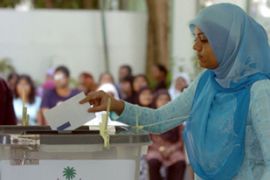President leads in Maldives poll
Votes from the strongest opposition area, in capital Male, are not yet in.

“And though we are a little off track in the progress of reforms, clearly the larger proportion of Maldivians still has faith in the governance of the president.”
However, early provisional results, which showed 45,798 people voting with the president and 22,338 voting against, included several islands viewed as strongholds of support for Gayoom and the main opposition’s voting backbone in the densely populated capital of Male was not yet in.
There were no details on how many of the 176,500 eligible voters, mostly Sunni Muslims, had turned out for the poll.
Gayoom’s DRP and the main opposition Maldivian Democratic Party (MDP) accuse each other of voter intimidation and breaking election rules.
Election officials said ballot papers were short at some stations but overall the vote appeared to be fair.
Criticism
Gayoom’s critics say he is stalling on implementing a raft of democratic reforms pledged in late 2004 to revamp the power structure in the face of harsh criticism of the government’s rights record.
His opponents billed a vote for a parliamentary system as a vote for him to quit, saying revenues from the country’s 89 luxury island resorts are not benefiting the half of the population who live in poverty, on a dollar a day.
Ahmed Shahmeen, a building contractor in Male, said: “We have had him for the last 29 years, and only now he is promising to make the judiciary independent. He could have done it at any time.
“He hasn’t done much on healthcare, education. He just wants to stay on in power. There is a big void.”
Dissent has also flared within the ranks of Gayoom’s cabinet, which under existing rules he handpicks and appoints.
Two leading members of his government quit earlier this month, accusing him of stalling on a new constitution and judicial independence in a country that only legalised the existence of political parties in 2005.
The Maldives’ first multi-party election is due next year.